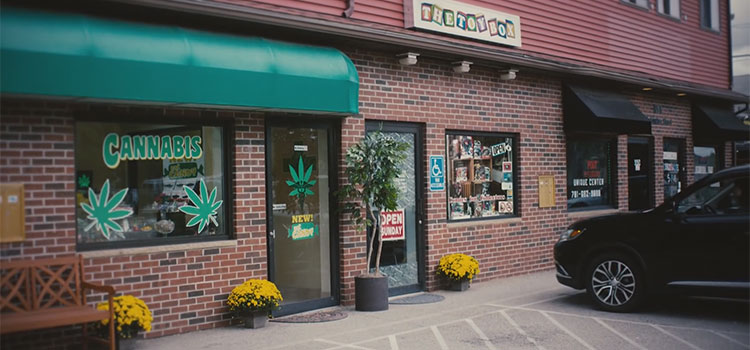The Campaign for a Safe and Healthy Massachusetts has released its first ‘No on 4’ TV spot depicting a mother and daughter driving through a town with several dispensaries, culminating with the duo arriving at a toy store and showing the small child staring at edibles through a dispensary window — the very dispensary a young man walks out of. The young man stops in his tracks and locks eyes with the woman, saying “Mom?” as the narrator urges the viewer to vote ‘no.’
Comments on the YouTube video have been disabled.
The ad, produced by Republican consulting firm Jamestown Associates, takes on an almost dystopian tone — “Question 4 would allow thousands of pot shops and marijuana operators throughout Massachusetts — in neighborhoods like yours,” the narrator says.
The spot uses two key arguments. The first — that drugged driving and fatal car accidents are up — has been thoroughly debunked. According to a report from the Drug Policy Alliance, based on figures from Colorado and Washington, there have been “no obvious increases in traffic fatalities” after legalization and arrests for DWI are down. While it is true that more drivers involved in fatal crashes have tested positive for THC in Washington, either alone or in combination with other drugs or alcohol, there is no evidence that cannabis was a contributing factor in those incidents — and the number of so-called drugged drivers isn’t up significantly, from 44 in 2010 to 72 in 2014.
The ad’s second claim, that there are more dispensaries than Starbucks and McDonald’s combined in Colorado, is actually true. However, the language in Question 4 caps the number of dispensaries in the state to 75 the first year, and with Massachusetts much smaller than the states where cannabis is legal it is highly unlikely that dispensaries would overtake the coffee and burger chains.
“This ad has about as much connection to reality as a Donald Trump campaign speech, which should come as no surprise since it’s funded by a Trump endorser and made by a Trump ad firm,” Jim Borghesani, a spokesman for YES on 4 said in the Boston Globe report.
The initiative is likely to pass, according to our poll aggregates, where 48 percent indicate support with 43 percent opposed.
